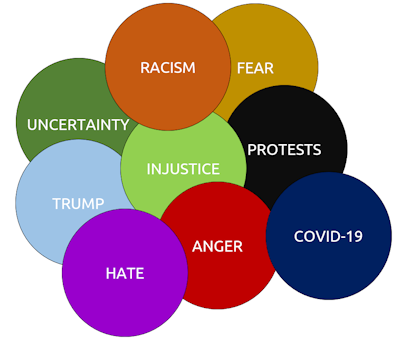Hyper-Polarization, the Pandemic, and the Need for a "Lifeboat Ethic"
by
Guy Burgess
|
This is the fifth of a series of posts that explore the danger that the United States' hyper-polarized political environment might suddenly erupt into large-scale political violence (as well as strategies for limiting the danger). Links to the full series plus other escalation-related materials can be found on the Conflict Fundamentals Seminar/Blog page on Escalation. |
The five previous posts present us with an urgent question: how are we going to get through the pandemic and its associated economic collapse in our hyper-polarized time without falling into an even more destructive escalation spiral that increases hostility, undermines our problem-solving ability, and poses a grave risk of large-scale violence. The first step, I think, is to recognize just how much trouble we are in. Here, I think it helps if we think of ourselves as being adrift in a terrible storm in one giant lifeboat. If we can't to figure out how to effectively work together to navigate the storm, then pretty much all is lost. The option of throwing some folks overboard is morally abhorrent and likely to result in catastrophic fights over who is going to throw whom overboard. What we really need to do is figure out how to get us all through these turbulent times.
As we try to do this, we are going to quickly discover that everyone has a role to play. This is a very big and complex lifeboat and the truth is that we need each other's skills, talents and, labor to operate it successfully.
| We are all, in a sense, on one giant lifeboat. If we can't to figure out how to effectively work together to navigate the storm, then pretty much all is lost. |
Once we realize this, it becomes obvious that we should think long and hard before we start complaining about the behavior of others on the lifeboat. Purely self-serving complaints aren't likely to be viewed very positively by others on the lifeboat. If we push too hard with these complaints, we could easily undermine the cooperative spirit on which everything depends. We would be much better advised to channel our inevitable frustrations with our fellow voyageurs into a common search for improvements in the lifeboat's organizational structure that would better protect everyone.
| Any social unit, and especially social units under stress, can only handle so many potentially divisive issues. So we shouldn't waste time and effort dealing with minor problems. We should focus, instead, on the big issues that represent existential threats to everyone on the lifeboat. |
In doing this, it is also worth prioritizing the changes that we seek. Any social unit, and especially social units under stress, can only handle so many potentially divisive issues. So we shouldn't waste time and effort dealing with minor problems. We should focus, instead, on the big issues that represent existential threats to everyone on the lifeboat.
This requires a forward-looking orientation. What we are most concerned about is building a social structure that will wisely and equitably get us through the tough times ahead. We must, obviously, address ongoing inequities—inequities that, in the lifeboat metaphor, are leaving people just barely clinging to the rails. Rescuing those who are now in such precarious positions will require vigorous efforts to address ongoing discrimination and other dynamics that are pushing people to the edge. The challenge is figuring out how to do this in ways that preserve and strengthen the social fabric. In doing this we are going to have to address the vast gap that exists between those enjoying luxury berths on the lifeboat and the many essential workers in steerage who are doing the hard and dangerous work of keeping the boat afloat.
In our efforts to provide those in steerage with critically-needed assistance, it is important to treat people equitably based on need, and not fall victim to the temptation to let this turn into a divisive and dangerous effort to label some folks as more deserving while demonizing others to the point where they might even be pushed overboard.
This also isn't the time to try to set the record straight on centuries worth of terrible and unrightable wrongs that virtually all groups and individuals think that they have suffered at the hands of others. If, going forward, we can foster the new, wiser, and more equitable lifeboat ethic, then, once the crisis has passed, it will be easier to go back and reassess history in ways that highlight the good things that need to be preserved and honored, while also acknowledging past failings and making an associated commitment never again to repeat those mistakes.
| People trying to address inequities on this lifeboat would be well advised to balance their arguments for much-needed reform with a celebration of the best of the history and ideals that bind us together. |
People trying to address inequities on this lifeboat would be well advised to balance their arguments for much-needed reform with a celebration of the best of the history and ideals that bind us together. Here, I think, the ideals are more important than the degree to which we have, in the past, failed to live up to them. The ideals represent the strongest, available foundation upon which we can build a more equitable, effective, and sustainable lifeboat ethic.
On the other hand, if we disavow these democratic ideals, we will find that there is not much left other than a selfish, all-out struggle for survival and dominance that could easily sink the lifeboat on which we all depend.








